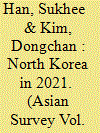|
|
|
Sort Order |
|
|
|
Items / Page
|
|
|
|
|
|
|
| Srl | Item |
| 1 |
ID:
050938


|
|
|
| 2 |
ID:
185200


|
|
|
|
|
| Summary/Abstract |
Continuing the trendline of 2020, North Korea’s key priorities in 2021 were to tighten its belt economically and control the COVID-19 pandemic. Those two goals were related. With its healthcare system no match for such a public health crisis, the government continued its utmost effort to prevent a COVID-19 disaster through the near-complete closure of its borders, severely hampering vital trade with China. As seen in the 8th Congress of the Workers’ Party of North Korea, however, chairman Kim Jong-un also prioritized maintaining an assertive stance toward the United States, even to the point of abjuring negotiations with Washington that might have unlocked vaccines or medical assistance. Instead, North Korea frequently criticized the US’s “hostile position” and carried out a variety of missile tests, which seemed more provocative and capable throughout the year. Pyongyang also restarted the Yongbyon nuclear facilities for producing fissile materials. This assertive and provocative behavior was emboldened by steadily closer ties with traditional allies, notably China and Russia. Meanwhile, North Korea largely showed a cold, dismissive attitude to its southern counterpart.
|
|
|
|
|
|
|
|
|
|
|
|
|
|
|
|
| 3 |
ID:
190033


|
|
|
|
|
| Summary/Abstract |
North Korea’s 2022 was largely a continuation of the political/economic, military, and diplomatic dynamic from 2020–21, but with different accents. Given the path dependence of military/nuclear modernization, domestic political/economic structural constraints, and the geostrategic situation in East Asia, 2023 in North Korea is likely to continue these same trends. Two big questions loom. (1) How will North Korea open up from COVID border closures, which might make better economic performance possible? (2) How will North Korea manage inter-Korean relations, and is the Korean Peninsula headed for a situation in which the security dilemma of a long-term deterrence relationship between the US–South Korea alliance and North Korea spills over into kinetic conflict?
|
|
|
|
|
|
|
|
|
|
|
|
|
|
|
|
| 4 |
ID:
169150


|
|
|
|
|
| Summary/Abstract |
Despite 25 years of unprecedentedly friendly ties between South Korea and
China, the Terminal High Altitude Area Defense (THAAD) disputes and China’s
ensuing sanctions against South Korea have forced the bilateral relationship
into an unprecedented standoff. Given South Korea’s growing dependence on
China in economic and North Korean affairs, commentators always assumed
that the South Korean government would “manage” this relationship. China has
maintained a close relationship to keep South Korea within its orbit, restraining
Seoul from further efforts to strengthen the U.S.–South Korean alliance. However,
the Park Geun-hye government’s decision to respond to North Korea’s incessant
provocations by deploying the THAAD system in South Korea caused China to
implement economic retaliation. The ensuing paralysis of bilateral relations has
lasted for over a year. A key problem for the future of the bilateral relationship is
the fact that both countries have lost trust in each other. China views South Korea’s
decision to deploy THAAD as a betrayal of its support, while South Korea objects
to China’s relentless economic bullying. Consequently, post–THAAD South Korea–
China relations are likely to reflect South Korea’s efforts to reduce its dependency
on China and to manage its development in a more balanced way.
|
|
|
|
|
|
|
|
|
|
|
|
|
|
|
|
|
|
|
|
|